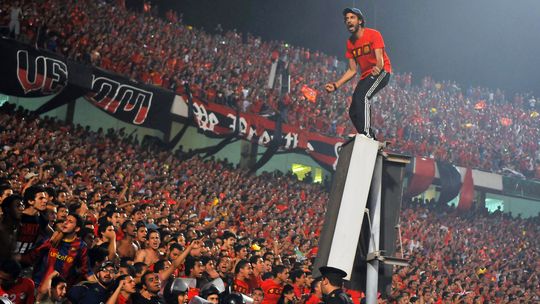By AFP
KHARTOUM: Sudan’s parliament on Wednesday called a halt to negotiations with South Sudan, official radio reported, as the foreign ministry accused Juba of the worst violation of its territory since independence.
“Parliament decided to stop negotiations and withdraw the delegation immediately from Addis Ababa,” Radio Omdurman reported after a second day of renewed clashes between the two nations in an oil-rich region along the disputed border.
Undersecretary of Foreign Affairs Rahma Mohammed Osman told reporters troops from the South had pushed 70 kilometers (43 miles) into Sudan and were in the Heglig oil region.
“I think this is the most serious after South Sudan’s secession and it affects our main oil production area,” he said.
“We are calling for the international community to put pressure on South Sudan to withdraw its troops from Heglig without any conditions,” Osman added.
Khartoum says it has complained to United Nations Secretary General Ban Ki-moon and to the African Union, which has been leading negotiations between the two nations on security, economic and border issues.
Sudan does not allow journalists to freely report from the border region, making independent verification difficult.
Legislators announced a “mobilization and alert” of the population, the radio report said, although President Omar Al-Bashir had already issued a decree forming a high-level committee for mobilization on March 26.
That same day a series of border clashes began, sparking international fears of a return to all-out war.
The committee was tasked with preparing training camps for the paramilitary People’s Defence Force, official media said at the time.
South Sudan’s parliamentary speaker on Wednesday urged lawmakers there to mobilize people to defend the fledgling nation in case of all-out attack by Khartoum.
Border tensions have escalated since the South became independent last July after an overwhelming “yes” vote following Africa’s longest civil war.
A diplomat in Addis Ababa told AFP Sudanese negotiators would not go to the Ethiopian capital “because it is not a good environment or atmosphere for negotiating.”
Negotiators from Juba and Khartoum failed to sign an agreement on security after the latest AU-mediated negotiations concluded last week in Addis Ababa.
Lead mediator Thabo Mbeki denied that negotiations had reached an impasse.
South Sudan’s head negotiator Pagan Amum accused the Khartoum delegation of walking out of the talks, saying “war mongering” prevented them from signing the agreement.
Sudan rejected the accusation that it refused to sign a deal, and said it had to return home for consultations before committing to the accord.
On Monday —the same day the latest outbreak of fighting began in the Heglig region —Bashir said Khartoum remained committed to negotiations.
He said this was despite the South’s involvement “directly” in attacks against Sudan.
Each side has blamed the other for starting the clashes.
“The main thing is to solve the security issues,” which are fundamental to resolving disputes over the border and economic matters, Bashir said.
The African Union said Wednesday it was “deeply alarmed” by worsening violence between Sudan and South Sudan and called for the withdrawal of Southern troops from the Heglig battle zone.
“The African Union expresses grave concern at the escalating armed conflict on the border between Sudan and South Sudan and calls upon both parties to exercise utmost restraint,” it said in a statement.
When South Sudan separated it took about 75 percent of oil production, but it still needs the north’s pipeline and port to export it.
The two sides have been unable to resolve a dispute over fees for the South’s use of the infrastructure, which led Juba in January to shut crude production after Khartoum began seizing Southern oil in lieu of compensation.
Since then there were moves towards warmer relations between the two sides but analysts said elements in Khartoum, as well as the South, opposed a rapprochement and suggested the flare-up over Heglig was an effort to sabotage improved relations.
After the clashes, Sudan suspended a planned April 3 summit between Bashir and the South’s President Salva Kiir. But following talks with the two leaders late last week Mbeki said the summit would proceed, after “necessary preparation.”


